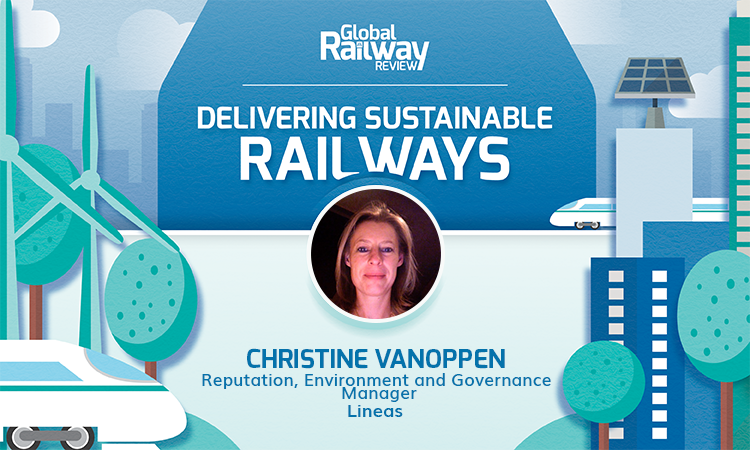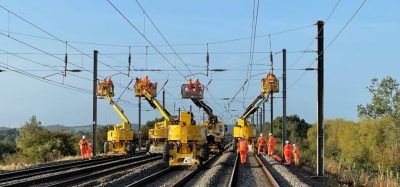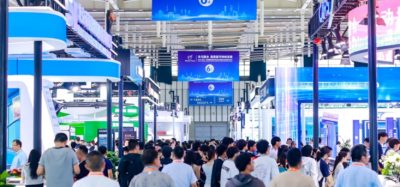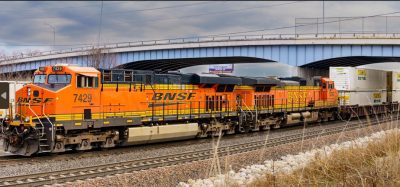Q&A with Christine Vanoppen of Lineas: Delivering Sustainable Railways
Posted: 18 May 2023 | Christine Vanoppen | 1 comment
For Global Railway Review’s exclusive Delivering Sustainable Railways feature series, Christine Vanoppen, Chair of the UIC Sustainability Platform and Reputation, Environment and Governance (REG) Manager for Lineas, discusses the importance of implementing ESG objectives correctly and the recent sustainability projects Lineas have been working on.


Can you talk about the importance of sustainability for Lineas?
Sustainability is the basis of Lineas’ strategic positioning, as rail freight is the most sustainable form of freight transport. This is at the heart of Lineas’ purpose and social relevance to strengthen our ‘license to operate’. To be successful in the long run, every company must make a positive contribution to society, especially in the fight against climate change. Through modal shift, Lineas contributes directly to the solution of several pressing societal problems: climate change, congestion, air quality and safety.
Equally, Lineas considers it important to ensure its corporate integrity. We ‘walk the talk’ by ensuring that our external ESG objectives are fully reflected in the way we operate internally as a company.
What are some of the latest sustainability projects that Lineas have been working on?
Sustainability is the basis of Lineas’ strategic positioning, as rail freight is the most sustainable form of freight transport.
Lineas was awarded the UNITAR certificate for corporate sustainability in 2020. The programme includes the completion of an action plan for three consecutive years. These actions were evaluated annually by an independent jury for their contribution to the SDGs and their achievement. Examples of these actions were: noise reduction programme, plastic elimination, code of conduct (Lineas and suppliers), LED on T77 locomotives, mobility policy, Lineas forest (tree planting action).
Following this, Lineas developed its own ESG framework also based on the SDGs, which resulted in the current 2022-2023/2027 action plan. This action plan focuses on four pillars:
1) Responding to climate change
2) Valuing human capital
3) Building sustainable & resilient supply chains
4) Engage and make our efforts visible.
Achievements within this plan so far include:
- the calculation of the carbon footprint (all scopes with baseline 2021)
- the submission of Science Based Targets (of which the validation is expected in the second half of the year)
- the launch of the ‘Our Movement’ programme that focuses on well-being (including the implementation of the new collective employment agreement).
On top of the above-mentioned actions, we are currently also working on technical solutions to reduce our carbon footprint by:
- implementing start/stop on our diesel locomotives
- testing bio-fuels like HVO (Hydrogenated Vegetable Oil), as well as FAME (Fatty Acid Methyl Ester), to drastically reduce GHG emissions.
What are some sustainability milestones that Lineas have reached?
An important milestone is certainly the recognition that sustainability should not only guide Lineas’ positioning, but also the way we conduct our business. This implies a focus that goes beyond the climate issue and places sustainability in a broader framework. Here, the recognition of the SDG framework was useful as a basis for the four sustainability pillars that now shape our ESG plan, for short-, medium- and long-term goals.
In your view, what are some of the biggest barriers when it comes to increasing sustainability in rail?
Sustainability is a rapidly evolving field that is increasingly becoming an integral part of the way of doing business. This means that sustainability will become even more professional in the future.
Faced with increased uncertainty and complexity in the supply chain and the wider geopolitical context, there may be a tendency to fall back on old, seemingly tried-and-tested recipes. At some point, mere survival of the sector might become the only priority. In such a context, keeping the sustainability agenda as a top priority is a challenge. This requires not only determination from top management and industry leaders, but also resources that are not always available.
Close cooperation and thus coordination between the different stakeholder groups is required; the railway company must improve its service and put the customer at the centre. Governments need to develop a modern regulatory framework through efficient and effective policies. It is also important that, where there is no level playing field between the different modes of transport, support schemes should remedy this inequality to enable a viable modal shift. In addition, infrastructure managers should modernise the rail network infrastructure and its management.
Can you tell us about some of challenges that Lineas have encountered in regard to sustainability targets? And how did you overcome them?
The biggest challenge is the (strategic) integration of ESG objectives and priorities, not only in a planning mode but at every stage of the managerial decision-making process. This requires governance and top management involvement, in a consistent manner.
What does the future of sustainability in rail look like to you?
Sustainability is a rapidly evolving field that is increasingly becoming an integral part of the way of doing business. This means that sustainability will become even more professional in the future. We will see more regulation and standardisation emerging. On the other hand, more investments will be able to flow to the rail sector if we play our cards right. Therefore, it is important to also embrace the emerging trends in sustainable finance and non-financial reporting. The financial sector has recognised the importance of the social value of sustainable business. It is up to the rail sector to make the most of this unique opportunity and rejoin the path of robust growth.


Christine Vanoppen is chairing the UIC Sustainability Platform, now for the third consecutive year. She joined Lineas, one of the larger, private rail freight companies in Europe, over six years ago. There she is working for the Public Affairs department as the Reputation, Environment and Governance (REG) Manager.
If you would like to take part in our Delivering Sustainable Railways feature series, or would like to nominate a colleague, please email: Elliot Robinson, Editorial Assistant, Global Railway Review.








Currently Commission and IM:s seem completely to disregard goal of EU..
Shortcomings of railways related basics, the infrastructure, shall:
1.
not be “cemented” and devastatingly advocated as excuses for extra upon clients of service rendered by on road industry.
2.
as obvious and documented, shall not be disregarded.
A New Old Railway now has to be constructed!